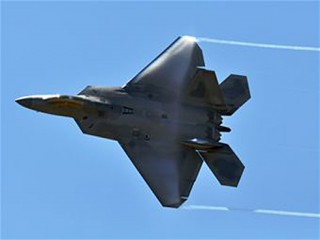Science and Technology

 Fierce and Fearless: Greta Gerwig's 'Barbie' Claims Title of Highest-Grossing Female-Directed Film
Fierce and Fearless: Greta Gerwig's 'Barbie' Claims Title of Highest-Grossing Female-Directed Film
added on Monday 24th July 2023

American Defense secretary Panetta restricted all F-22 flights
Panetta endorsed Air Force efforts to figure out why some F-22 pilots have experienced dizziness and other symptoms of an oxygen shortage while flying, but his personal intervention signaled a new urgency.
American Defense Secretary Leon Panetta ordered on Tuesday, May 15 all F-22 flights to remain near the airfield, due to some mysterious problems with the aircraft's oxygen system, problems which previously have been reported by a number of pilots. At the same time, Panetta summoned help from Navy and NASA experts.
Panetta endorsed Air Force efforts to figure out why some F-22 pilots have experienced dizziness and other symptoms of an oxygen shortage while flying, but his personal intervention signaled a new urgency. A secretary of defense does not normally get involved in a service-specific safety issue unless it is of great concern.
The Air Force grounded its F-22s for four months last year because of the oxygen-deficit problem, and now some pilots are refusing to fly them. An Air Force advisory panel headed by a retired Air Force general studied the problem for seven months and reported in March that it could not pinpoint the root cause. It endorsed a plan keeping the aircraft flying, however, with pilots using special sensors, filters and other safety precautions.
Panetta was briefed on the problem last Friday, just days after a CBS "60 Minutes" report featured two F-22 pilots who said that during some flights they and other pilots have experienced oxygen deprivation, disorientation and other problems. They cited safety concerns as well as the potential for long-term personal health issues.
Apparently, the defense chief have been aware of the F-22 problems according to Pentagon spokeman which told CBS that they've known about it "for quite some time." In light of the recent deployment of several F-22s to the Persian Gulf and because of pilots' expressions of alarm, Panetta chose to "dive a little more deeply into the issue."
In a letter to Air Force Secretary Michael Donley, Panetta ordered that F-22 flights remain "within proximity of potential landing locations" so that pilots can land quickly in the event they experience an oxygen-deficit problem. Kirby said the specifics of those flight restrictions are to be set by individual F-22 pilots and commanders.
Panetta also told Donley to accelerate the installation of an automatic backup oxygen system in each F-22. The first of those is to be ready for use by December, Kirby said.
And the Pentagon chief ordered the Air Force to call on the expertise of the Navy and NASA in pursuit of a solution.
In a conference call with reporters, Sen. Mark Warner, D-Va., and Rep. Adam Kinzinger, R-Ill., said they were briefed by the Air Force and told that the number of pilots who came forward with complaints has risen from two to nine. Warner called Panetta's action a "step in the right direction" but said questions still remain.
"This is a confidence issue that has to be addressed fully and transparently by the Air Force," Warner said.
 Fierce and Fearless: Greta Gerwig's 'Barbie' Claims Title of Highest-Grossing Female-Directed Film
Fierce and Fearless: Greta Gerwig's 'Barbie' Claims Title of Highest-Grossing Female-Directed Filmadded on Monday 24th July 2023













